Leading conservationists from around the world have called for environmental lobbyists to stop blocking nuclear energy in defiance of the science consensus. It's clean, it's green, and it's needed to mitigate climate change and protect biodiversity.
In an open letter to environmentalists, over 60 scientists ask the environmental community to "weigh up the pros and cons of different energy sources using objective evidence and pragmatic trade-offs, rather than simply relying on idealistic perceptions of what is 'green'".
Organized by ecologists Professor Barry Brook and Professor Corey Bradshaw from the University of Adelaide's Environment Institute, the letter supports their recent article (DOI: 10.1111/cobi.12433) in Conservation Biology.

The 1970s are over, say scientists, and it is time for environmentalists to understand that.
"Full decarbonization of the global electricity-generation sector is required soon to avoid the worst ravages of climate change," says Professor Bradshaw, Director, Ecological Modelling at the Environment Institute and recently appointed Sir Hubert Wilkins Chair of Climate Change. "Biodiversity is not only threatened by climate disruption arising largely from fossil-fuel derived emissions, it is also threatened by land transformation resulting from renewable energy sources, such as flooded areas for hydro-electricity, agricultural areas needed for biofuels and large spaces needed for wind and solar farms."
In the article, the researchers evaluated land use, emissions, climate and cost implications of three different energy scenarios: 'business as usual' fossil-fuel dominated; a high renewable-energy mix excluding nuclear; and an energy mix with a large nuclear contribution plus some renewable and fossil-fuel sources.
They also used "multi-criteria decision-making analysis" to rank seven major energy types based on costs and benefits, testing the sensitivity of their rankings to bias stemming from philosophical ideals.
Those philosophical ideals have been present in the United States for decades. 20 years ago President Bill Clinton and Senator John Kerry got nuclear energy banned over the objections of scientists, but Democrats had been pushing for bans 20 years prior to that. Since America leads the world in high technology, the quality and safety of nuclear power would be generations ahead of what exists now, had nuclear energy not be cast aside.
"When compared objectively with renewables, nuclear power performs as well or better in terms of safety, cost, scalability, land transformation and emissions," says Professor Barry Brook, Chair of Climate Change at the Environment Institute for this study, and now Professor of Environmental Sustainability at the University of Tasmania.
"Not only does next-generation nuclear power provide emissions-free electricity, it is a highly concentrated energy source that consumes legacy waste and minimises impacts to biodiversity compared to all other energy sources."
They argue that there is strong evidence for supporting advanced nuclear power systems with complete fuel recycling as part of a portfolio of sustainable energy technologies that also includes appropriate use of renewables, energy storage and energy efficiency.
"Idealized mixes of nuclear and renewables are regionally dependent, and should be compared objectively without prejudice or preconceived notions of what is 'green'," says Bradshaw.






Comments